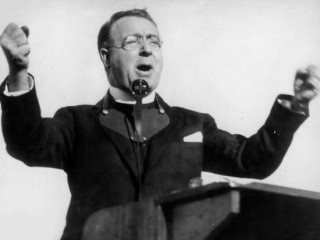
Charles Coughlin biography
Date of birth : 1891-10-25
Date of death : 1979-10-27
Birthplace : Hamilton, Ontario, Canada
Nationality : Canadian
Category : Famous Figures
Last modified : 2011-02-11
Credited as : Priest, at Royal Oak,
Charles Edward Coughlin was a Canadian-born Roman Catholic priest who became a political organizer in the United States and, during the 1930s, a radical right-wing radio personality.
Charles Edward Coughlin was born on October 25, 1891, in Hamilton, Ontario, Canada, and received his education in Catholic schools and at St. Michael's College of the University of Toronto. At the age of 20, he began studies for the priesthood, receiving his ordination in 1916. After assisting in several parishes in the Detroit area, Coughlin was formally incardinated into the Detroit diocese in 1923. Three years later, Coughlin's bishop assigned him to the new Shrine of the Little Flower Church in the suburban community of Royal Oak, Michigan.
In 1926, Coughlin started a weekly broadcast over the local radio station which proved so popular that, within four years, the Columbia Broadcasting System began carrying it nationally. A series of florid denunciations of communism in 1930 gave him a national reputation and occasioned his appearance before the Committee to Investigate Communist Activities, of the United States House of Representatives. By the end of the year, however, with the country in the throes of the Great Depression, Coughlin had shifted his broadcasts to emphasize the necessity for drastically altering American capitalism under a program keyed to monetary inflation called "social justice," which Coughlin based on the late-19th-century papal encyclical Rerum novarum.
In 1931, the network, worried by Coughlin's attacks on the Hoover administration and by other contentious material in his addresses, discontinued his weekly broadcasts. With contributions from his listeners, Coughlin organized his own radio network, which grew to 26 stations.
During the 1932 presidential campaign, Coughlin vigorously championed Franklin D. Roosevelt, proclaiming that America's choice was "Roosevelt or ruin." Roosevelt carefully cultivated Coughlin and benefited substantially from his support in the first year of the New Deal, but he always kept the priest at arm's length. Coughlin, however, saw himself as an unofficial member of the Roosevelt administration and assumed that the president would follow his advice for combating the Depression, particularly his advocacy of massive currency inflation through silver coinage. When Roosevelt refused to fully accept Coughlin's schemes, the priest became a loud critic of the administration.
In 1934, Coughlin formed the National Union for Social Justice to combat communism and to fight for currency inflation and government control of big business. In 1936 Coughlin, determined to stop Roosevelt's re-election, made the National Union the nucleus for the Union party, which also amalgamated much of the followings of the late Huey Long and of Francis E. Townsend, a crusader for old-age pensions. Roosevelt was overwhelmingly re-elected, while the Union party's candidate polled less than 900,000 votes.
After 1936, Coughlin's influence declined rapidly. He organized the Christian Front to succeed the National Union and trained his oratorical guns on Roosevelt's foreign policy, which he believed would inevitably involve the country in another war. He also concentrated on the fancied internal menaces of Communists and Jews (who seemed interchangeable in Coughlin's thinking). Fascist Italy and Nazi Germany, he announced, were bulwarks against "Jewish-Communist" power in Europe. Coughlin enunciated a program for an anti-Semitic, fascist-style corporate state, under which established political institutions in the United States would virtually disappear.
Coughlin's anti-Roosevelt oratory became more shrill when World War II broke out in Europe in 1939 and the administration provided more and more assistance to the Allied governments. In 1940, the larger stations in Coughlin's radio network, acting on the basis of a recent National Association of Broadcasters ruling barring "controversial" speakers, refused to renew his broadcasting contract. When he continued his attacks on the government after Pearl Harbor, his bishop officially silenced him and the Post Office Department banned his weekly newspaper from the mail.
With his newsletter banned, his radio network gone, and his bishop silencing him, Coughlin confined his activities to those of an ordinary parish priest, in 1942. He retired from his pastorate at the Shrine of the Little Flower in 1966. He concerned himself with his newly-built home in Birmingham, Michigan, and still wrote pamphlets denouncing Communism.
Coughlin died on October 27, 1979 at his home in suburban Detroit. He was remembered as the fiery, vibrant, and opinionated priest who followed the directive of his church over his own feelings towards the government. Near his death, Coughlin said he "couldn't take back much of what [he] had said and did in the old days when people still listened to [him]."
















